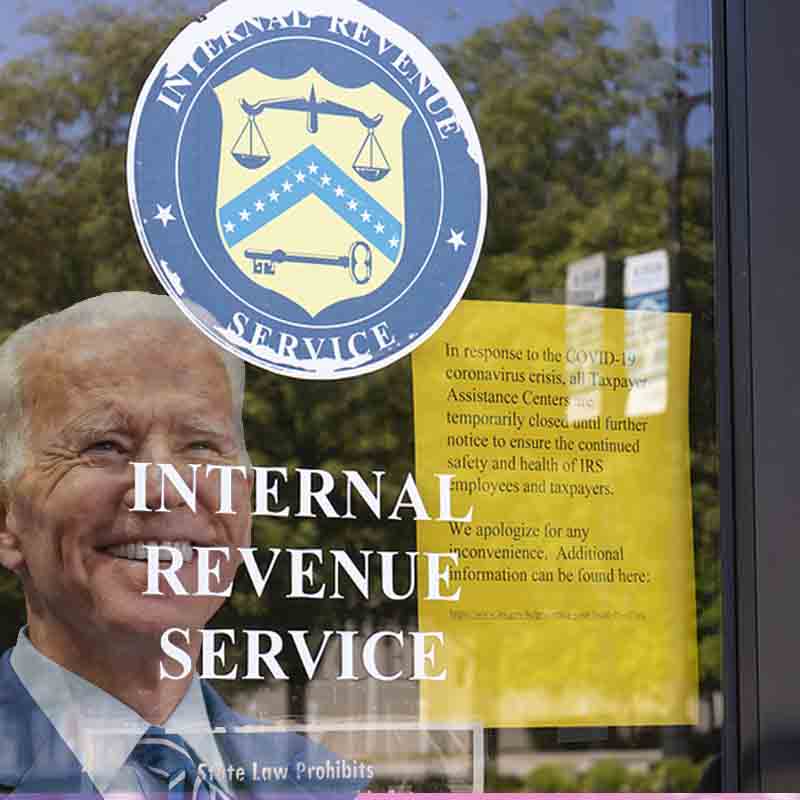If you have a bank account with a balance of more than $600 in it, a proposal by the Biden administration would allow the IRS to have unprecedented access to your financial information. When Joe Biden and Democrats say they want to “Tax the Rich”, what they are not telling the middle class is that they also want to make sure they are taxing them as much as legally possible too.
According to Forbes Magazine, IRS access to your bank account is all part of how President Joe Biden will “Build Back Better”.
It’s all part of Biden’s American Families Plan that calls for banks and financial institutions to report more detailed information about the average everyday American’s financial holdings.
Banks will be required to monitor and report on their customers’ aggregate account outflows and inflows.
“In other words, the IRS will know about all of your bank accounts, whether you earned income on that account or not, how much is in the account in a given year, and how much was transferred in and out of the account,” Forbes reported. “It is unclear how this would work, but what is clear is that this new reporting obligation will create a massive compliance effort on the part of financial institutions, and eliminate a massive blindspot that the IRS is currently enduring.”
Yahoo! News reported, “Biden‘s American Families Plan lets the IRS snoop on your bank accounts”.
“Take a look at this fact sheet from the Treasury Department, explaining a new provision that would require banks and financial institutions to start telling the tax agency what people have in their bank account when money is moved around, and the like,” Yahoo! reported.
“A well-functioning tax system requires that all taxpayers pay what they owe. An unfortunate characteristic of the current system, however, is an asymmetric adherence to tax law by the nature of income received. While roughly 99% of the taxes due on wages are remitted to the Internal Revenue Service, compliance across other forms of income is substantially less, as the IRS has difficulty verifying whether income from opaque sources is properly reported. Noncompliance is concentrated at the top of the distribution: A recent study found that the top 1 percent failed to report 20 percent of their income and failed to pay nearly $175 billion in taxes owed annually,” the U.S. Department of the Treasury claims.
The IRS has made clear that it needs additional resources to pursue costly tax evasion. These are not easy cases to resolve; the average investigation of a high-wealth individual takes two years to complete and often requires the IRS to commit substantial resources. Moreover, the lack of adequate investment in compliance has significant revenue consequences. Indeed, several hundred taxpayers who committed the most egregious form of evasion—failing to file taxes all together—cost the federal government $10 billion over a period of just three years.
Over the last decade, a declining IRS budget has deprived it of the resources it needs to effectively enforce our nation’s tax laws. After accounting for inflation, the IRS budget has fallen by about 20 percent, and its workforce has been depleted, with the number of complex revenue agents (who are dedicated to high-end evasion and large corporate cases) falling by 35 percent. As a result, IRS audits have fallen across the board, and particularly for the highest earners.
In order to combat declining revenue, the IRS wants more direct access to your personal financial accounts.
“When the IRS has information from third parties, income is accurately reported, and taxes are fully paid. However, high-income taxpayers disproportionately accrue income in opaque sources—like partnership and proprietorship income—where the IRS struggles to verify tax filings. As a result, up to 55 percent of taxes owed on these less visible income streams is unpaid, with disproportionate levels of non-compliance for those at the top of the income distribution,” the Treasury Department said.
